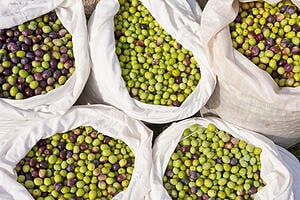
Why are expeller pressed oils all the rage these days? Because frankly, they’re produced in a healthier-for-you, more natural way. And that — being healthy and natural in general — is the real thing that’s all the rage these days.
Most people don’t know how plain old seed oils are produced, so it’s often hard for a typical consumer to compare. They don’t know that the industry standard for oil — in fact, the vast majority of oil available in the world — is produced using chemical solvents.
The difference between the industry standard and expeller pressed oil lies in how the oil is removed from the seeds. Once you start learning more, however, it may be hard to choose anything but an expeller pressed oil.
Canola Oil & Seed Information
Before we begin, if you’d like to learn more about the canola plant (a cousin of the rapeseed plant) or just the basics about canola oil, you can start by reading more below:
Why Non-Gmo Canola Oil Does, In Fact, Exist
Organic Canola Oil — Isn’t That An Oxymoron?
With that information in your back pocket, let’s dig in!
How Is Conventional Canola Oil Produced?
Unlike expeller pressed oils, regular “plain old” canola oil is taken out of the seeds of the canola plant through solvent extraction.
Oil molecules are naturally found inside the canola seeds, and the oil has to be removed in some way. There are two possible ways to do this:
- squeeze it out, or
- use a chemical solvent to draw the oil out without using any physical pressure
This solvent removal is a much more high tech system that pulls the oil out of the seed. This process requires that first the seeds are ground up into a paste. Next, the seed paste is washed with a solvent — usually hexane — to release the fat molecules that are stored. Then the solvent must be removed, leaving a dry seed paste and the recently produced oil.
To remove that solvent from the oil, it is “flashed off” through heat in a sealed chamber. Then the oil/solvent blend is heated to approximately 212˚ F, distilling off the solvent and theoretically leaving virtually no detectable levels in the oil if the proper techniques have been applied.
However, microscopic portions of up to 25 parts per million (25 ppm) of hexane can theoretically remain in the meal, which has been a point of high debate in the natural food industry.
Finally, that oil is then subject to the refining process, also known as “RBD” or Refined, Bleached & Deodorized in the industry. This is what makes canola oil have such a light color and flavor. Canola oil isn’t the only refined oil though; this similar process that occurs with soybean, sunflower, safflower, and refined olive oil.
Solvent expelling gets 97-99% of the oil out of the seed. In comparison to other methods, this is a great yield and is the most efficient way to get all the oil from the canola seeds. This efficiency is one of the reasons that it is the cheapest canola option on the market. If you’re curious to learn more about the whole process in general, we recommend this article:
This video will also give you some insight on the process on how canola oil is made:
How Is Expeller Pressing Different?
How is Expeller Pressed Canola Oil different than conventional?
Expeller pressing uses a press to physically squeeze the oil out of the seed, rather than use chemicals. With this method, no solvents are used in the process, and therefore there’s no chance of having any hexane residue left over.
An expeller press is a screw-type machine which presses oil through a caged barrel-like-cavity, using friction and continuous pressure. The screw drives forward to literally squeeze the oil from the compressed seeds. There isn’t any added heat in this process, but the pressure and friction involved in the pressing process creates heat from the unit in the range of 140-210˚ F. (So technically, this process is not “cold pressed” as a result.)
After the oil is removed, the remaining seed solids are left over forming a hardened cake, which is removed and later sold as meal for animal feed. Expeller pressing gets 87-95% of the oil out of the seed(some claim as little as 65% is removed), so there is some oil still left over after pressing. Therefore, this expeller pressed option is not the most efficient (and doesn’t have the highest yield), which usually makes this oil more expensive than the solvent expelled standard.
Expeller pressed oil is also typically refined or RBD using the same process as described above. This refining process involves additional heat from steam and the use of a natural earthen bleaching clay.
There is a cold pressed and expeller pressed option as well, described more here: The Difference Between Solvent Expelled, Expeller Pressed And Cold Pressed Oil
What Kinds Of Canola Oil Can Be Expeller Pressed?
There are a few different kinds of canola oil that can be expeller pressed: the most common are Non-GMO Canola Oil and regular (also known as conventional, or GMO) canola oil. These titles denote whether the oil is produced from GMO or non-GMO seeds. Either way, these oils are produced using the same expeller pressed methods but it is just the seed type that is different.
Topics: Canola Oil













